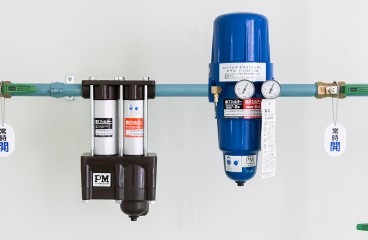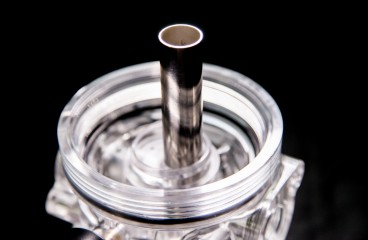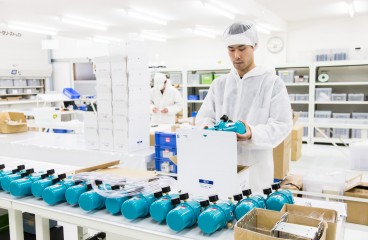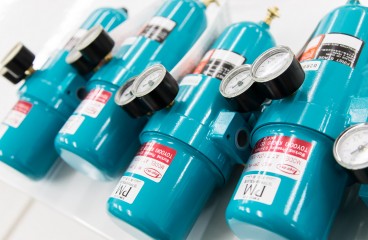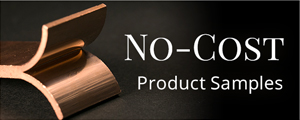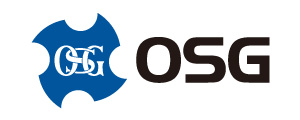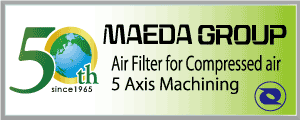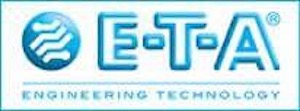Manufacture and sale of filters for compressed air, manufacture and sale of urethane products; manufacture of shell cores; R&D of new products
Maeda Shell Service Co. Ltd. View Company Info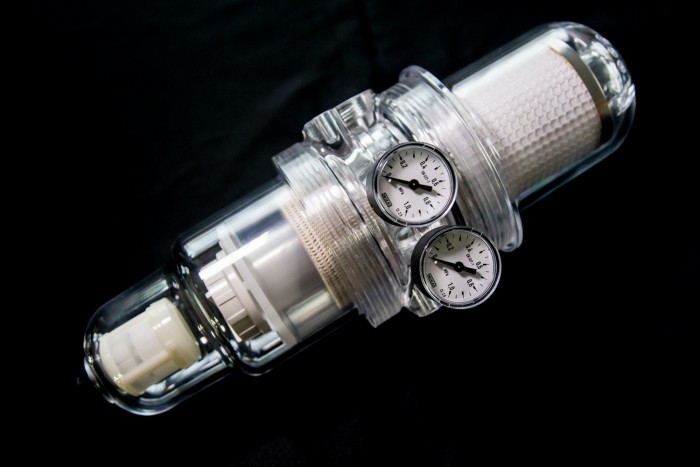
Compressed air is essential on a manufacturing site, as it is used in equipment such as machine tools and carrier devices that move with air pressure. But did you know that compressed air is a source of various kinds of manufacturing defects and quality problems? Maeda Shell Service Co., Ltd. produces and sells high-performance filters that remove impurities from this compressed air. The company’s production site and head office are located in the city of Okazaki City, Aichi Prefecture, which is home to many companies that are connected to Toyota Motor Corporation. Maeda Shell Service’s filters are widely used in the production of automobiles, food, pharmaceuticals, and cosmetics among other products, contributing to the improvement of manufacturing quality.
Invisible Impurities in Compressed Air
Compressed air is atmospheric air of which volume has been squeezed and reduced by a compressor. The expansion force created by the difference in the pressure between the compressed air and atmospheric pressure is used in such applications as the motive power for devices such as air brakes, motors or cylinders, and air blowers. However, hidden in this compressed air are various kinds of impurities, including moisture, oil, iron powder, dust, harmful bacteria, mold, rust, and carbon. According to a UK-based professional journal on filters, compressing one square meter of atmospheric air containing 140 million suspended impurity particles to eight times atmospheric pressure increases the number of impurity particles to 1.12 billion. Compressing atmospheric air causes the impurities in the air to surge on the order of several up to dozens of times the atmospheric pressure.
“There is a tendency to overlook the fact that dirty air is a cause of defects, precisely because air is invisible,” says Tatsuhiro Maeda, President of Maeda Shell Service, explaining the hidden risk in compressed air.
It was 1985 when the company started to pay attention to compressed air. They had imported filters from La-Man Corporation in the United States, in order to improve quality in the company’s plating business. They then discovered that the air blown onto products before plating to remove dirt from the surface was actually depositing impurities and causing defects. Having realized the problem with compressed air, Maeda Shell Service started by acquiring distribution and patent rights to filters from La-Man. Then, in 1993, the company rethought the structure of filters from scratch and developed its own filters for compressed air.
Even today the dirt in compressed air tends to be overlooked. Back then, starting up filter marketing operations from nothing meant that they had to awaken customers to the invisible impurities in air. Thus, the company developed proprietary technology for measuring the number of particles in compressed air using a “particle counter” that measures the number of solid particles by shining a laser on the air. The technology was patented around the world. “Even the concept of measuring [impurities in] compressed air didn’t exist at that time,” says Maeda, speaking of the significance of the measuring technology, which enabled the effect of the company’s filters to be shown clearly in numerical data.
Highest Quality Air Produced by the 3-in-1 Multi-Dry Filter
Maeda Shell Service’s leading product at the moment is the 3-in-1 Multi-Dry Filter. This product features three types of filters in one unit to remove impurities including moisture, oil, and bacteria. It eliminates 99.99% of solid particles that are 0.01 micrometers or larger. Compressed air in the unit first passes through the first filter, a cyclone separator, which is a centrifuge that separates moisture and oil droplets. Next, dirt and particles that are three to five micrometers or larger are removed in the second filter element, which is made of a composite of cotton and stainless wire. When the air passes through this filter, it can be dried to a maximum humidity of 15% through the vaporization of moisture droplets as a vacuum state is approached, working on the same principle as a tornado. Lastly, as the air passes through the third element, seven layers of the filters remove oil mist and solid particles that are 0.01 micrometers or larger. The compressed air created by this product boasts quality that fully meets quality standards such as ISO, HACCP, and FSSC 22000.
The cyclone, which is the first filter, is approximately 30% more energy efficient than conventional stainless mesh filters, since there is hardly any loss of pressure in the compressed air. Although the second and third filter elements have to be changed once every six to 12 months, this cyclone does not require the replacement, which decreases maintenance costs as well.
Many producers have witnessed visible improvements after adopting this filter that converts compressed air into the highest quality air. When spraying paint on vehicle bodies, the Japanese automaker that is the world’s largest used to struggle with defects such as uneven finish and shedding caused by impurities in the compressed air. The company then attached filters made by Maeda Shell Service at the head and the spray ends of the compressed air route. It also set up a “particle counter” on the side of the line to automatically measure impurities in compressed air every minute as part of a system to prevent manufacturing defects. This resulted in an improvement in the defect rate requiring repainting or other adjustments from 7% to 0%. Based on this result, this major automaker now uses these filters on all its painting lines.
At a different plant of the same automaker, tools called “impact wrench” which are used in engine assembly, used to break at the rate of one every three days. When Maeda Shell Service measured the compressed air used for these tools, it detected more than 10,000 impurity particles at least 0.3 microns in size per liter. These impurities were determined to be the cause of the tool failures. Installing filters here resulted in zero impact wrench failure for more than a year. This too was taken by this automaker as a good example of “kaizen” or improvement and adopted on its other new engine assembly lines.
These filters are also showing spectacular results in food factories where rigorous hygiene management is required. A major Japanese brewery uses them to prevent contamination with foreign substances, when filling beer containers. A snack food manufacturer uses them to guard against the growth of mold caused by air blown in when filling bags on the production line. A bread plant has increased the quality of its bread by removing impurities in the compressed air of air guns used in conveyors.
More than 2,500 companies in Japan have already adopted Maeda Shell Service’s filters, which have produced innumerable examples of improvements. That just goes to show that although compressed air is widely used on the manufacturing floors, its adverse effects had been overlooked.
Bringing Filters to Manufacturing Sites Worldwide
At present, Maeda Shell Service uses several agents to sell filters to end users in a wide range of industries throughout Japan. Moreover, a number of major machine tool manufacturers have started equipping some of their machines with Maeda Shell Service’s filters as part of their efforts to improve the quality of their own products.
Looking ahead, Maeda Shell Service will put effort into expanding into global markets. Right now, the company’s only outlet outside of Japan is a sales agent in South Korea. “Selling filters that remove impurities from compressed air, which tends to be overlooked, requires a persistent sales approach, as sellers have to make proposals to users,” says President Maeda. “But,” he emphasizes, “manufacturers with the desire to make improvements on the production floor and to increase product quality most certainly exist outside as well as inside Japan, and so the demand is there.” Maeda Shell Service’s filters could be perfect as a way for companies that manufacture and sell similar filters outside Japan to expand their product lineup. Backed by a record of contribution to quality improvements in Japan’s manufacturing floors, Maeda Shell Service is now looking for partners with whom it can open up new markets around the world.
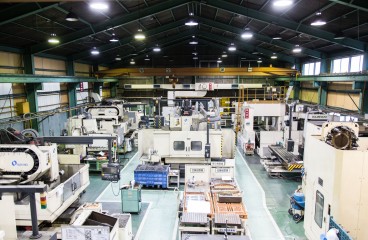
Maeda Shell Service Co. Ltd.
Business Description: Manufacture and sale of filters for compressed air; manufacture and sale of urethane products; manufacture of shell cores; R&D of new products
Headquarters address: 76-4 Kanayama, Ikegane, Okazaki, Aichi
Representative: Tatsuhiro Maeda
Established: 1965
Number of employees: 73
Website: http://www.maedauni.co.jp/english/2012051411094833.html


